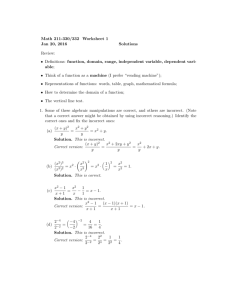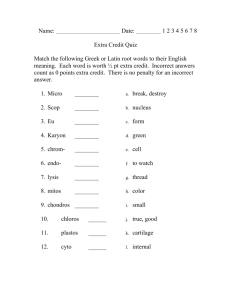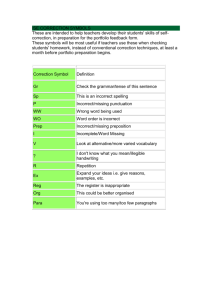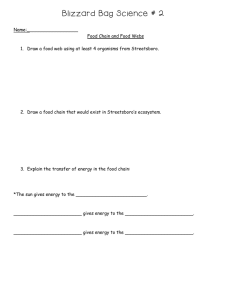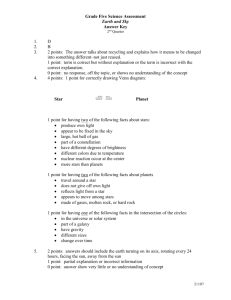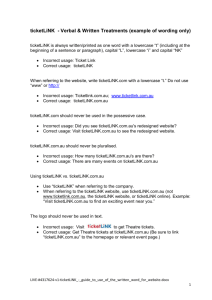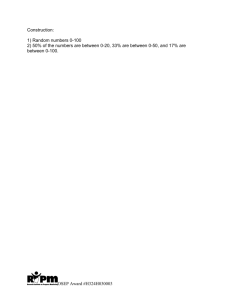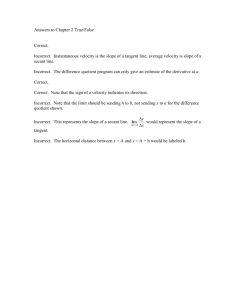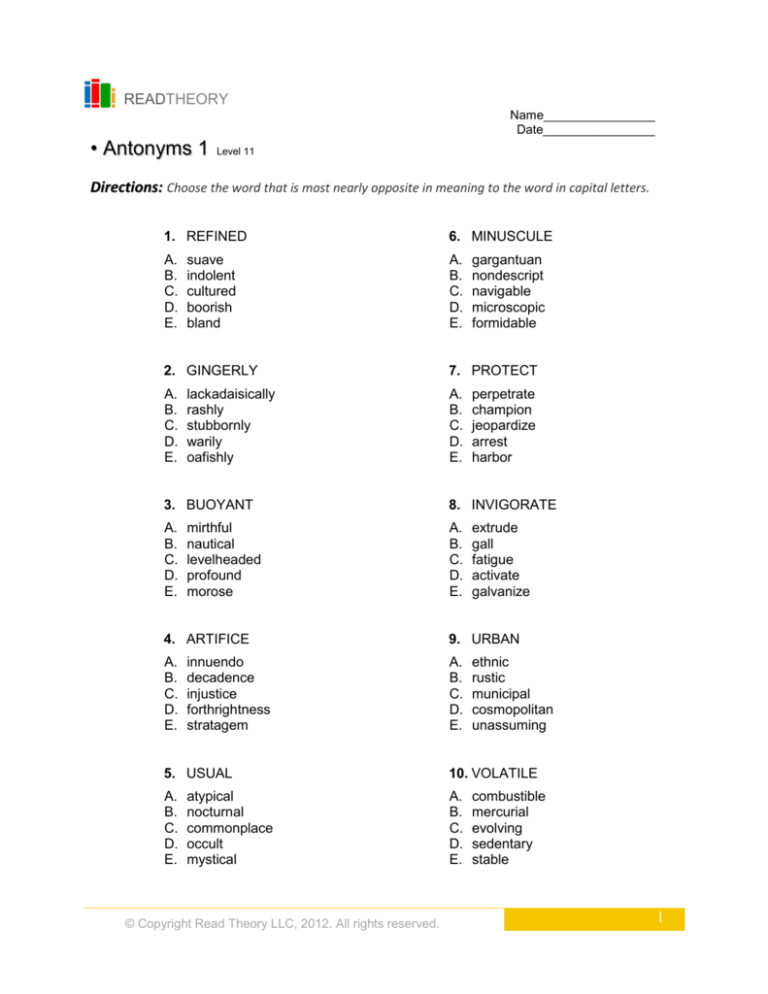
READTHEORY
Name________________
Date________________
• Antonyms 1
Level 11
Directions: Choose the word that is most nearly opposite in meaning to the word in capital letters.
1. REFINED
6. MINUSCULE
A.
B.
C.
D.
E.
A.
B.
C.
D.
E.
suave
indolent
cultured
boorish
bland
gargantuan
nondescript
navigable
microscopic
formidable
2. GINGERLY
7. PROTECT
A.
B.
C.
D.
E.
A.
B.
C.
D.
E.
lackadaisically
rashly
stubbornly
warily
oafishly
perpetrate
champion
jeopardize
arrest
harbor
3. BUOYANT
8. INVIGORATE
A.
B.
C.
D.
E.
A.
B.
C.
D.
E.
mirthful
nautical
levelheaded
profound
morose
extrude
gall
fatigue
activate
galvanize
4. ARTIFICE
9. URBAN
A.
B.
C.
D.
E.
A.
B.
C.
D.
E.
innuendo
decadence
injustice
forthrightness
stratagem
ethnic
rustic
municipal
cosmopolitan
unassuming
5. USUAL
10. VOLATILE
A.
B.
C.
D.
E.
A.
B.
C.
D.
E.
atypical
nocturnal
commonplace
occult
mystical
© Copyright Read Theory LLC, 2012. All rights reserved.
combustible
mercurial
evolving
sedentary
stable
1
Answers and Explanations
1) D
The word refined means well-mannered or free of vulgarity or coarseness. A person who is refined might also be called
well-bred and would behave in a polite manner. The opposite of refined is coarse, vulgar, or lacking in manners. Because
boorish means rude or unmannered, choice (D) is correct.
(A) is incorrect because suave means polite or smoothly agreeable. This is practically synonymous with refined, not the
opposite of it.
(B) is incorrect because indolent means lazy. This is not the opposite of refined.
(C) is incorrect because cultured means enlightened or well-mannered. This is synonymous with refined, not the opposite
of it.
(E) is incorrect because bland means soothing or mild. This is not the opposite of refined.
2) B
The word gingerly means very carefully. A cat burglar would move gingerly so as to avoid making a sound or being
detected. The opposite of gingerly is carelessly. Because rashly means impetuously or done without consideration or
thought, choice (B) is correct.
(A) is incorrect because lackadaisically means listlessly or lethargically. This is not the opposite of gingerly.
(C) is incorrect because stubbornly means resolutely or obstinately. This is not the opposite of gingerly.
(D) is incorrect because warily means very carefully. This is synonymous with gingerly, not the opposite of it.
(E) is incorrect because oafishly means stupidly. This is not the opposite of gingerly.
3) E
The word buoyant means cheerful and optimistic. Someone who is buoyant is usually in good spirits. The opposite of
buoyant is unhappy or pessimistic. Because morose means ill-humored or melancholy, choice (E) is correct.
(A) is incorrect because mirthful means merry or full of laughter. This is synonymous with buoyant, not the opposite of it.
(B) is incorrect because nautical means pertaining to ships or navigation. This is not the opposite of buoyant.
(C) is incorrect because levelheaded means sensible. This is not the opposite of buoyant.
(D) is incorrect because profound means of deep meaning. This is not the opposite of buoyant.
4) D
The word artifice means deception or trickery. One of the most famous examples of artifice is the Trojan horse, a
supposed gift that actually tricked the Trojans into opening their gates to the invading Greek army. The opposite of artifice
is honesty or a lack of deception. Because forthrightness is straightforwardness or directness, choice (D) is correct.
(A) is incorrect because an innuendo is a hint or insinuation. This is not the opposite of artifice.
(B) is incorrect because decadence is decay. This is not the opposite of artifice.
(C) is incorrect because an injustice is a violation of one’s rights. This is not the opposite of artifice.
(E) is incorrect because a stratagem is a deceptive trick. This is synonymous with artifice, not the opposite of it.
5) A
The word usual means normal, routine, or customary. A usual occurrence is something that happens every day. The
opposite of usual is unusual or not normal. Because atypical means irregular or not normal, choice (A) is correct.
(B) is incorrect because nocturnal means done at night. This is not the opposite of usual.
(C) is incorrect because commonplace means ordinary or uninteresting. This is practically synonymous with usual, not the
opposite of it.
(D) is incorrect because occult means pertaining to magic or supernatural powers. This is not the opposite of usual.
(E) is incorrect because mystical means pertaining to magic or spiritual powers. This is not the opposite of usual.
6)
A
© Copyright Read Theory LLC, 2012. All rights reserved.
2
The word minuscule means very small. For example, a single speck of dust is miniscule in size. The opposite of
minuscule is huge. Because gargantuan means huge or enormous, choice (A) is correct.
(B) is incorrect because nondescript means ordinary or not distinctive. This is not the opposite of minuscule.
(C) is incorrect because navigable means wide and deep enough for a ship to pass through. Though this does imply size,
it is not the direct opposite of minuscule, since the meaning of navigable is limited specifically to size in water.
(D) is incorrect because microscopic means very small or tiny. This is synonymous with minuscule, not the opposite of it.
(E) is incorrect because formidable means difficult or fear-inspiring. This is not the opposite of minuscule.
7) C
The word protect means to defend or guard. For example, a goalie in hockey protects the goal from opposing players’
shots. The opposite of protect is to endanger. Because jeopardize means to endanger or put at risk, choice (C) is correct.
(A) is incorrect because perpetrate means to commit an offense. This is not the opposite of protect.
(B) is incorrect because champion means to support militantly. This is not the opposite of protect.
(D) is incorrect because arrest means to stop or slow down. This is not the opposite of protect.
(E) is incorrect because harbor means to give shelter to. This is practically synonymous with protect, not the opposite of it.
8) C
The word invigorate means to energize or stimulate. For example, the caffeine in coffee invigorates a coffee drinker. The
opposite of invigorate is to weaken in energy or tire out. Because fatigue means to exhaust, choice (C) is correct.
(A) is incorrect because extrude means to force or push out. This is not the opposite of invigorate.
(B) is incorrect because gall means to annoy. This is not the opposite of invigorate.
(D) is incorrect because activate means to cause to function. This is not the opposite of invigorate.
(E) is incorrect because galvanize means to stimulate by shock or revitalize. This is practically synonymous with
invigorate, not the opposite of it.
9) B
The word urban means pertaining to a city. For example, a large city such as Chicago would be called an urban area. The
opposite of urban is rural. Because rustic means pertaining to rural areas or people, choice (B) is correct.
(A) is incorrect because ethnic means relating to races. This is not the opposite of urban.
(C) is incorrect because municipal means pertaining to a city or its government. This is practically synonymous with urban,
not the opposite of it.
(D) is incorrect because cosmopolitan means worldly. This is not the opposite of urban.
(E) is incorrect because unassuming means modest. This is not the opposite of urban.
10) E
The word volatile means changeable or explosive. A situation is volatile if it is unstable or could change any second. The
opposite of volatile is nonvolatile or unchanging. Because stable means steady or resistant to sudden change, choice (E)
is correct.
(A) is incorrect because combustible means easily burned. This is not the opposite of volatile.
(B) is incorrect because mercurial means changing. This is synonymous with volatile, not the opposite of it.
(C) is incorrect because evolving means developing into being over time. This is not the opposite of volatile.
(D) is incorrect because sedentary means motionless or requiring sitting. This is not the opposite of volatile, since being in
motion and being changeable are not synonymous.
© Copyright Read Theory LLC, 2012. All rights reserved.
3


